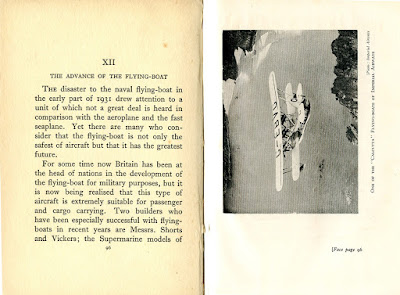Amongst my dad’s childhood books are two volumes in matching red bindings: The Splendid Book of Aeroplanes and The Splendid Book of Steamships by G. Gibbard Jackson. My dad’s name and address are inscribed inside both of them in my grandfather’s neat hand, together with the dates they were bought: the 25th and 26th of July, 1932. The steamships volume seems to have been bought the very next day on the strength of the aeroplanes one.
If so, it was a mistake. The Splendid Book of Aeroplanes is indeed a splendid book, packed with splendid tales, from the pioneers of flight right up to the nineteen-thirties. In contrast, the steamships book is unremarkable and prosaic, little more than a descriptive record.
For example, until I read the aeroplanes book, I had never heard of Mrs. Victor Bruce who made the first flight from London to Tokyo in 1930; a riveting story of forced landings, sheltering with desert tribesmen on the shores of the Persian Gulf, and contracting malaria in the Mekong jungle. This was just one of her many exploits in a life of derring-do. Incredibly, she lived until 1990. Why is she not as famous as Amy Johnson or the Campbells?
Then there is the moving story of Saloman Andrée’s balloon expedition to the North Pole in 1897, which failed to make the expected progress. The explorers despatched their last messenger pigeon, then nothing further was known of them until over thirty years later when their remains, diaries and exposed photographic plates were found by chance. They had been forced to land on the ice where they survived for over three months. The discovery of their final camp in 1930 was a global sensation.
 |
| George Gibbard Jackson (1878-1935) |
Who was this prolific writer that few today will have heard of? A little research reveals that when he died, George Gibbard Jackson (1878-1935) was postmaster at Fareham, Hampshire. He had joined the postal service in his native Warwickshire, and worked his way up from the position of sorting clerk. Before Fareham he had spent several years as postmaster at Cobham, Surrey. He married twice, first to telegraphist Kate Emery in Coventry in 1901, and then, after Kate died, to Mabel Elizabeth Millington in Stivichall, Coventry, in 1915. He had four sons, one of whom died in childhood.
So writing was really a sideline. How could someone with a full-time job, bringing up a family between the wars in small-town southern England, find time to research and write so many books? Did his job have slack periods during the daytime? Did he spend all his spare time writing and researching? Did he neglect his family?
What about resources? In a previous post about research before the internet, I was at least referring to research in well-resourced university settings. Gibbard Jackson would have had to rely mainly on local libraries, newspapers, home encyclopaedias and similar works of reference, possibly books borrowed by post from national libraries, and maybe an occasional visit to larger resources in London or Southampton.
For example, he might have used Encyclopedia Britannica or Arthur Mee’s Children’s Encyclopedia. Arthur Mee says quite a bit about the early days of flight – the Wright Brothers and so on – and while it makes only the briefest reference to the mystery of Andrée’s expedition, the newspapers were full of it in 1930 and 1931 after their final camp was discovered. Similarly, newspapers closely followed Mrs Victor Bruce’s flight during September, October and November, 1930. These secondary sources would have been sufficient for a writer of cracking tales, like Jackson, to be able to put together books for boys. And possibly his Isle of Wight book was planned on holiday. Only when you begin to look at the detail that is now available on the internet do you discover the omissions and deficiencies. For example, Jackson includes none of the photographs that emerged from the plates found in Andrée’s final camp.
He must have been pleased with his achievements. Perhaps he even made a bit of money from his writing – he was comfortably well-off when he died. But it’s not the kind of writing I would want to do for long. It’s too much like work.
Some of Jackson’s books are now accessible in full-text format, such as The Splendid Books of Engineering, Locomotives and Steamships, but so far there seems to be no online version of the aeroplanes book.
https://archive.org/details/splendidbookoflo00jackuoft/page/n5 (locomotives)
https://archive.org/details/splendidbookofst00jackuoft/page/n5 (steamships)
https://archive.org/details/splendidbookofen00jackuoft/page/n5 (engineering)



Fascinating reflections as you seek to look behind the books to the author, his methods and his motivation. George Gibbard Jackson was quite a guy but I don't like his middle name. It sounds like something you might find inside a dead turkey.
ReplyDeleteGeorge Giblets Jackson! Perhaps it was a family name - one could look into his ancestry but I'm not really that motivated.
Delete